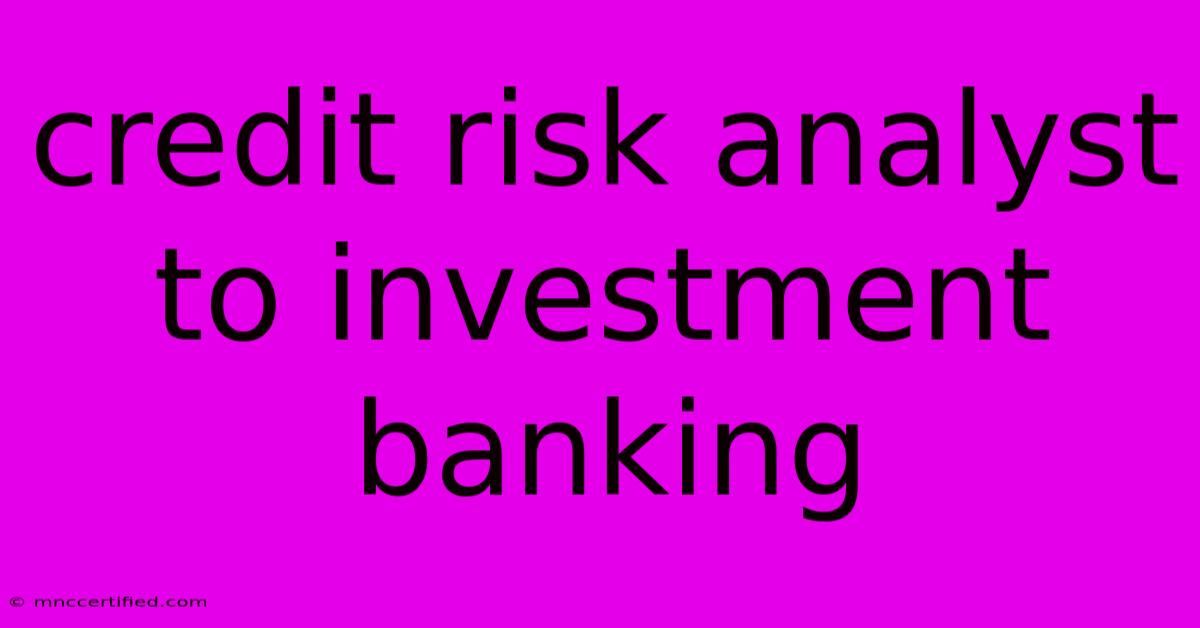Credit Risk Analyst To Investment Banking

Table of Contents
From Credit Risk Analyst to Investment Banking: A Viable Career Path
Are you a credit risk analyst looking to break into the fast-paced world of investment banking? It's a common ambition, and one with a clear path. While the roles seem distinct, the skills and knowledge you've honed as a credit risk analyst are highly valuable in investment banking, making the transition a realistic and rewarding one.
Understanding the Link: Credit Risk and Investment Banking
At first glance, these two fields might appear worlds apart. However, a closer look reveals a strong synergy. Both require a deep understanding of financial markets, a keen analytical eye, and the ability to evaluate risk.
- Credit risk analysts assess the creditworthiness of borrowers and companies, analyzing financial statements, market trends, and industry dynamics to determine the likelihood of repayment.
- Investment bankers advise companies on mergers and acquisitions, debt and equity financing, and other financial transactions. Their work relies heavily on understanding the financial health and risk profiles of the companies they serve.
Key Skills that Translate
Your credit risk analyst experience equips you with crucial skills highly sought after in investment banking. Here are a few examples:
- Financial Analysis: You are proficient in interpreting financial statements, assessing cash flows, and understanding financial ratios. These skills are fundamental to investment banking, where you'll be evaluating potential investment opportunities and structuring deals.
- Risk Assessment: Your expertise in evaluating credit risk directly translates to investment banking, where you'll need to assess the risk of various transactions and investments.
- Strong Communication: Effectively communicating complex financial concepts to stakeholders is crucial in both roles. You've already honed this skill in your previous role, explaining credit risk assessments and recommendations to various audiences.
- Analytical Mindset: You're adept at analyzing data, identifying trends, and drawing conclusions – skills essential for market research, financial modeling, and deal structuring in investment banking.
The Pathway to Investment Banking
While the transition isn't automatic, with strategic planning and effort, you can successfully enter investment banking.
1. Enhance your skillset:
- Develop strong financial modeling skills: Investment banking relies heavily on financial modeling. Consider taking courses or workshops to build your proficiency in this area.
- Deepen your knowledge of investment banking products: Familiarize yourself with investment banking products like mergers and acquisitions, debt and equity financing, and other financial instruments.
- Build your network: Attend industry conferences and events, connect with investment bankers on LinkedIn, and leverage your existing professional network.
2. Tailor your resume and cover letter:
- Highlight your credit risk experience: Frame your skills in a way that demonstrates their relevance to investment banking.
- Showcase your analytical abilities: Emphasize your ability to analyze data, identify trends, and make sound financial judgments.
- Research specific investment banking roles: Target your application to roles that best align with your experience and interests.
3. Prepare for interviews:
- Understand the investment banking process: Be familiar with the different stages of an investment banking deal, including deal origination, due diligence, and execution.
- Practice case studies: Investment banking interviews often involve case study scenarios. Prepare by working through sample case studies and developing your problem-solving skills.
- Be prepared to discuss your career goals: Clearly articulate your aspirations in investment banking and how your prior experience will contribute to your success.
The Rewards of the Transition
A career shift from credit risk analyst to investment banking opens a world of opportunities. You'll be exposed to a dynamic environment, collaborating on high-stakes transactions, and working with some of the most influential companies and individuals in the financial world. The potential for professional growth and earning potential is significant.
Conclusion
Your experience as a credit risk analyst is a valuable asset in your pursuit of an investment banking career. By strategically developing your skills, building a strong network, and presenting your qualifications effectively, you can make a successful transition. Remember, the financial world is vast and full of opportunities – with dedication and the right preparation, you can pave your way to a fulfilling career in investment banking.

Thank you for visiting our website wich cover about Credit Risk Analyst To Investment Banking. We hope the information provided has been useful to you. Feel free to contact us if you have any questions or need further assistance. See you next time and dont miss to bookmark.
Featured Posts
-
Windshield Repair Cost Without Insurance
Nov 07, 2024
-
Trump Victory Propels Markets To Record Highs
Nov 07, 2024
-
Youth League Aston Villa Cruise Past Club Brugge
Nov 07, 2024
-
University Offers Well Being Support
Nov 07, 2024
-
Former Man Utd Star Sacked By Coventry
Nov 07, 2024